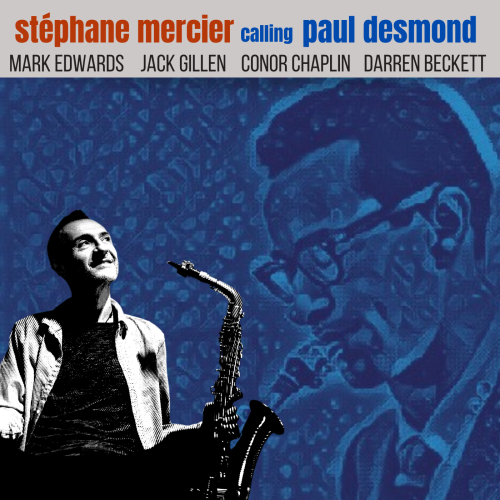
Stéphane Mercier "Calling Paul Desmond"
Il y a quelques années le producteur Jean Kluger me lançait l’idée d’un album
reprenant des compositions du célèbre Paul Desmond, le saxophoniste le plus
écouté de cool jazz, grâce à son Take Five, immortalisé par le Dave Brubeck Quartet
(à l’heure où j’écris ces lignes : 187 millions d’écoutes sur Spotify, pas mal pour du
jazz des années 50 !).
L’idée me poursuivit, puisque Desmond était mon premier coup de foudre au
saxophone alto. Adolescent, j’écoutais ses vinyles sur le vieil ampli à lampes de
mon grand-père. Mais comment m’y prendre ? J’étais revenu m’installer à Bruxelles,
capitalede l’Europe, et me demandais qui serait intéressé de jouer cette musique, et
quel label prendraitle risque de sortir des reprisesd’un altiste américain,moins
connu que son leader Brubeck ?
Quelques recherches me confirmèrent que Desmond avait assez composé pas mal
d’œuvres qui étaient bien diversifiés et intéressants. Il enregistra énormément,
entre autres aux côtés de Gerry Mulligan,Chet Baker, et Jim Hall.
Je revis Jean Kluger lors d’un vernissage, et lui expliquai que je ne trouverais jamais
une production belge osant produire un tel album. Il me répondit du tac au tac qu’il
avait envie de le produire lui-même. Une joie immédiate suivie de panique s’empara
de moi : en effet, la responsabilité d’endosser le rôle de Desmond dans un quartet
était énorme.
Nous nous revîmes quelques jours plus tard pour en parler, et nous décidâmes ce
jour-là de tous les éléments qui constituent l’album : je m’occuperais des
arrangements (pour un quartet avec piano et l’autre avec guitare, représentant
Dave Brubeck et Jim Hall), nous y ajouterions deux compositions personnelles, et
surtout,nous irions enregistreren Angleterre avec des musicienslocaux, grâce à
l’aide du fabuleux batteurs et proche ami Darren Beckett,qui me conseillerait sur les
musiciens et le studio à réserver.
La suite est histoire, comme on dit. Ces deux jours en studio furent magiques, et
certaines des toutes premières prises sont celles qui figurent sur l’album.
Voici donc un humble hommage dédié à un homme discret et certainement humble
lui-même, mais qui changea le son du saxophone alto à jamais.
Stéphane Mercier



